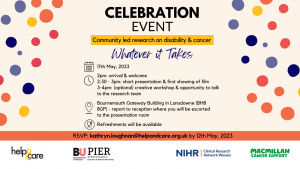
We would like to invite you ALL to our very exciting CELEBRATION EVENT on 17th May 2023 in BG-302.
We have been exploring disabled, chronically ill, visually impaired and neurodivergent people’s experiences of cancer services. We also explored how using the community research model can provide a level of shared understanding between researchers and community members to enable the capture of the perspectives of individuals currently underserved by health and social care research.
This project was commissioned by Macmillan Cancer Support and Wessex Cancer Alliance, and overseen by Involving People – Help & Care, Bournemouth University’s Public Involvement in Education and Research (PIER) partnership and the Research Centre for Seldom Heard Voices.
At this event, we will be sharing the outcomes of our research project, with opportunities to take a look at the report, a film which has been developed using the attendee’s artistic creations for the visuals, with the experiences they shared in a voiceover, and to engage in a creative arts workshop. A variation of healthcare professionals, academics and those with lived experience have been invited to this event, so we can all discuss the success of the project, as well as what more needs to be done.
Everyone is welcome and there will be refreshments!
Please get in touch with Stevie Corbin-Clarke (scorbinclarke@bournemouth.ac.uk) with any queries.
 Community-Based Research Event – register your interest
Community-Based Research Event – register your interest










 Nursing Research REF Impact in Nepal
Nursing Research REF Impact in Nepal Fourth INRC Symposium: From Clinical Applications to Neuro-Inspired Computation
Fourth INRC Symposium: From Clinical Applications to Neuro-Inspired Computation ESRC Festival of Social Science 2025 – Reflecting back and looking ahead to 2026
ESRC Festival of Social Science 2025 – Reflecting back and looking ahead to 2026 3C Event: Research Culture, Community & Cookies – Tuesday 13 January 10-11am
3C Event: Research Culture, Community & Cookies – Tuesday 13 January 10-11am Dr. Chloe Casey on Sky News
Dr. Chloe Casey on Sky News ECR Funding Open Call: Research Culture & Community Grant – Application Deadline Friday 12 December
ECR Funding Open Call: Research Culture & Community Grant – Application Deadline Friday 12 December MSCA Postdoctoral Fellowships 2025 Call
MSCA Postdoctoral Fellowships 2025 Call ERC Advanced Grant 2025 Webinar
ERC Advanced Grant 2025 Webinar Horizon Europe Work Programme 2025 Published
Horizon Europe Work Programme 2025 Published Update on UKRO services
Update on UKRO services European research project exploring use of ‘virtual twins’ to better manage metabolic associated fatty liver disease
European research project exploring use of ‘virtual twins’ to better manage metabolic associated fatty liver disease